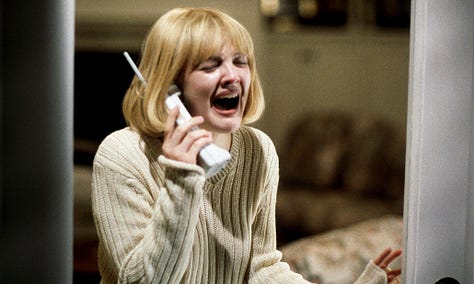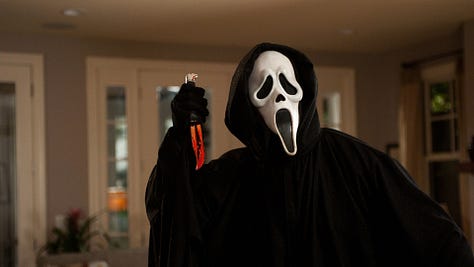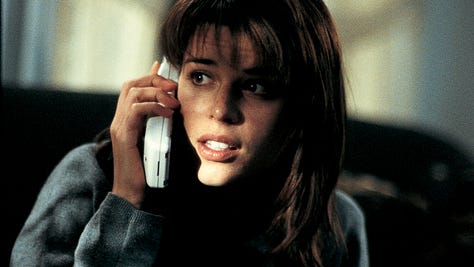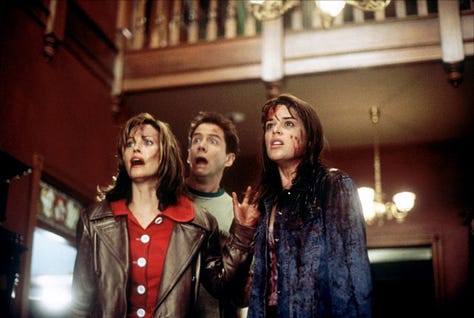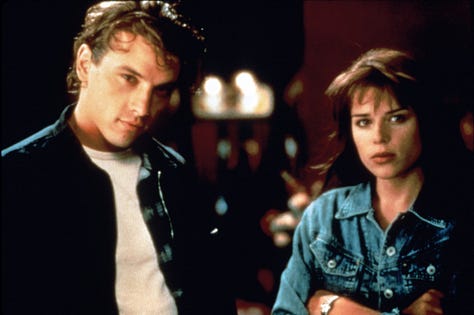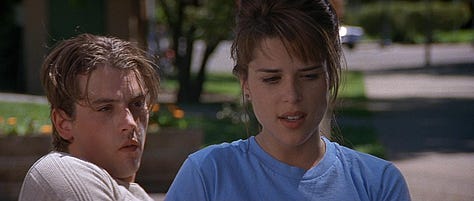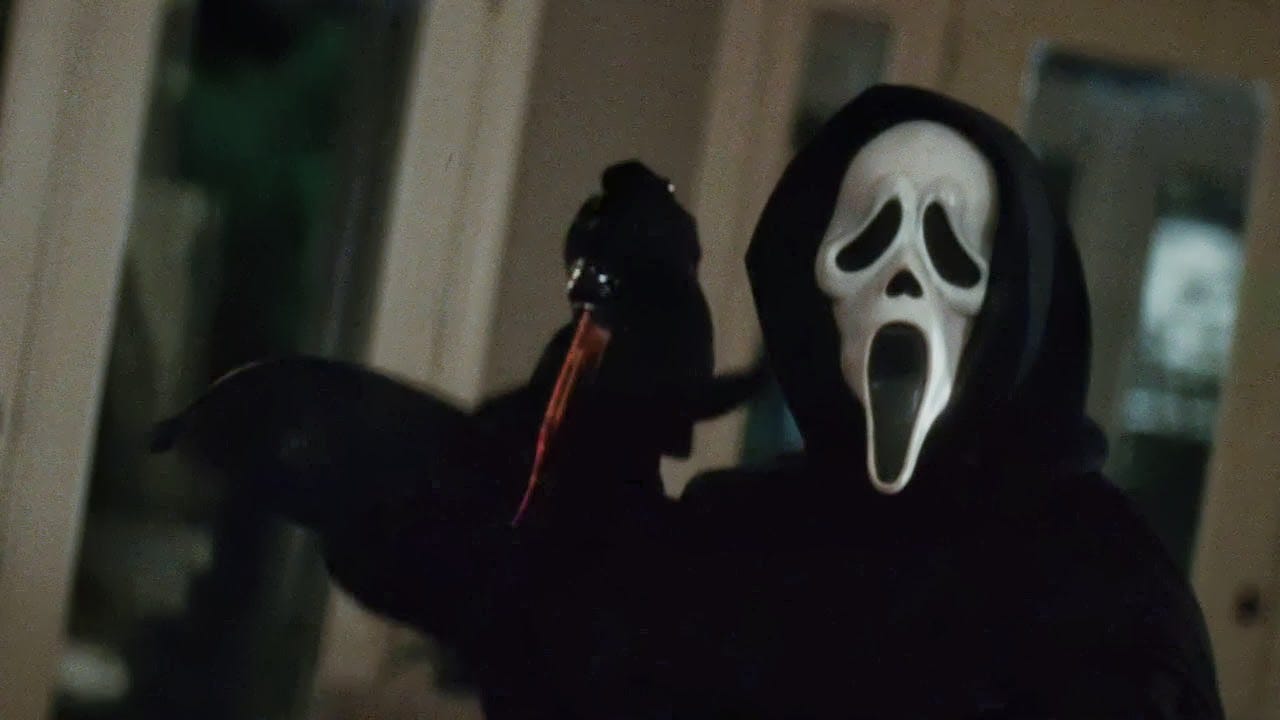SCREAM
1996 • Wes CravenScreenplay: Kevin Williamson
Cast: David Arquette, Neve Campbell, Courteney Cox, Matthew Lillard, Rose McGowan, Skeet Ulrich, Drew Barrymore, Jamie Kennedy, Liev Schreiber, Roger L. Jackson
Cinematography: Mark Irwin
Music: Marco Beltrami
Producer: Cathy Konrad, Cary Woods
Dimension Films
What's your favorite scary movie?
The quiet town of Woodsboro is plunged into terror when a mysterious killer begins targeting high school students. The story follows Sidney Prescott (Neve Campbell), a strong-willed and resourceful teenager who becomes the primary target of the masked Ghostface killer. As the body count rises, Sidney finds herself at the center of a series of gruesome murders. With the help of her friends and her charming but secretive boyfriend (Skeet Ulrich), Sidney tries to unravel the identity of the killer. However, the line between reality and fiction blurs as the characters realize that the murders seem to be following the rules of a typical horror movie. Sidney must confront her own fears and uncover the truth before she becomes the next victim.
The 90s version of a "meta" horror film played a pivotal role in revitalizing the genre, and rightfully so. In an era filled with predictable horror tropes, thanks to the oversaturation of slasher films from the 80s, Scream emerged as a breath of fresh air. Its success can be attributed to its extreme self-awareness, poking fun and revitalizing its own genre. This self-awareness resonated with audiences, creating a unique viewing experience where fans of horror could both enjoy the scares and appreciate the film on a meta-level.
The characters in the movie were not just victims; they were knowledgeable about horror movies and their clichés. This is best exemplified by Randy (Jaime Kennedy), the horror film geek who actually explains the "rules" of horror films openly, to both the other characters and to the audience itself, deconstructing the genre's patterns even as the others find themselves ensnared in a real-life horror movie. Randy serves as the audience's surrogate within the film. His insightful commentary transforms him from a character into a meta-commentator, bridging the gap between the fictional world of Woodsboro and the real world of the viewers. Through Randy, the film engages in a playful and intelligent dialogue with its audience, inviting them to participate actively in the narrative. By acknowledging the clichés and tropes of the horror genre, Scream subverts them. It challenges the characters and the audience to question their assumptions about who the killer might be and what might happen next.
Scream didn't rely solely on gore and jump scares, though it has plenty of both. Unlike its contemporaries, which often leaned heavily on visceral shocks and graphic violence, Scream took a more cerebral approach to fear. It understood that true terror could be evoked through psychological tension, intelligent storytelling, and well-written characters. The fear isn’t just in the shocking moments but in the uncertainty of who to trust and what might happen next. The film's success revitalized the horror genre by inspiring a new wave of filmmakers to embrace self-reflexivity and intelligence in their storytelling. It encouraged a shift toward more psychologically complex narratives, paving the way for a diverse range of horror films that challenged conventions and elevated the genre into a realm of intellectual and artistic exploration.
Craven doesn't merely deconstruct the genre; he does it with style, panache, and a deep understanding of his audience's expectations. Make no mistake, this film is unabashedly 90s. Craven and screenwriter Kevin Williamson skillfully balance moments of intense suspense and terror with witty dialogue and sharp humor, a common trait of 90s teen thriller films and TV shows. Craven delivers the goods, not just as a clever dissection (no pun intended) of the horror genre, but as a slick and polished product that viewers of “TRL” and “The Real World” would relish. (Those were television shows on MTV, kids.)
Ghostface swiftly established himself as a new and enduring horror icon. The Ghostface killer is different in every film, but his (or their) appearance remains constant. Thus by making Ghostface look like a generic bagged costume from Spirit Halloween, it makes him even scarier. Ghostface can be anyone. Behind the mask could be a neighbor, a friend, or even a family member, emphasizing the horror of the familiar turning lethal. Unlike Jason Voorhees the super zombie, Freddy Krueger the nightmare king, or even Michael Myers, who possessed a remarkably high pain tolerance, Ghostface was disturbingly human. He was not just a mindless killer; he was a character aware of the genre's conventions, making him both a symbol of fear and a walking/stabbing deconstruction of horror tropes. Ghostface's anonymity and adaptability, with different characters assuming the mantle in each subsequent film, added an element of unpredictability, ensuring that the fear he instilled remained fresh and innovative across multiple installments.
Scream not only revolutionized horror with its meta approach but also introduced audiences to a memorable ensemble cast, each delivering Kevin Williamson’s brilliantly self-aware dialogue with finesse and charisma. Neve Campbell, in the role of Sidney Prescott, portrays a strong, resilient protagonist, becoming an all-time “Final Girl” that could rival Laurie Strode. Her emotional range and ability to convey vulnerability make her a relatable and compelling lead amidst the chaos. David Arquette, as the affable Deputy Dewey, injects the film with humor and warmth, providing a much-needed contrast to the tension-filled scenes. Courteney Cox, riding success from her ultra-mega TV hit Friends, takes on the character of ambitious reporter Gale Weathers. Cox brings a sharp edge to Gale, the determined tabloid journalist willing to do whatever it takes to uncover the truth. Rose McGowan, playing Sidney’s best friend Tatum, adds vivacious and spirited energy to the film, while Matthew Lillard and Skeet Ulrich, as Stu and Billy respectively, bring a brooding intensity to the proceedings. Their performances, along with the previously mentioned Jaime Kennedy, are electrifying, blending (ahem) “teenage” charm with sinister undertones. Drew Barrymore's cameo at the beginning of the film is a stroke of genius. At the time, the biggest star on the poster, her unexpected fate within the opening sequence subverts the audience's expectations, setting the tone for the film's willingness to challenge your expectations. This cameo serves as a powerful statement: in Scream, no one is safe, and anyone could be the next victim… or the killer.
Scream's release on December 20, 1996, marked a departure from the usual holiday season lineup dominated by family-friendly movies and Oscar contenders. Despite this unconventional timing, the film managed to carve (pun definitely intended) its niche, with its fresh take on horror and its clever subversion of genre expectations. Following its box office success, Dimension Films wasted no time in bringing back Craven and Williamson for the sequel. Scream 2 (1997) continued the story of Sidney Prescott, once again blending suspense, humor, and meta-commentary to great effect. It was met with positive reviews and strong box office numbers, and while the original set a high bar creatively, the sequel was a solid follow-up. Scream 3 in 2000 rounded out the trilogy, not quite hitting the same financial numbers as the original two films, but still performed very well. (Scream also inspired a series of parody spoofs in the Scary Movie franchise, which ironically, was Scream’s original working title.) Years later, the franchise was resurrected with Scream 4 (2011), re-teaming Craven and Williamson one last time. This installment, released more than a decade after the previous film, tackled incorporating elements of the digital age, bridging the gap between the classic slasher era and contemporary horror sensibilities. The film’s success launched a new trilogy, which continued to evolve with Scream 5 (titled Scream) and 2023’s Scream VI. Scream 5 introduced Jenna Ortega to the franchise, who is seemingly taking over Neve Campbell’s role as Scream Queen. Ortega herself is becoming a bit of her own Scream Queen outside the franchise, starring in such horror projects as The Babysitter: Killer Queen (2020), X (2022), Studio 666 (2022) as well as the Netflix horror/comedy series Addams Family spin-off Wednesday and the upcoming long-awaited sequel Beetlejuice 2.
The Scream legacy will likely continue as Scream VII has been announced, but as of this writing, there are no firm details on the story or casting.
No, please don't kill me, Mr. Ghostface, I wanna be in the sequel!
Notoable Awards & Accomplishments
Saturn Award Winner: Best Horror Film
Saturn Award Winner: Best Actress (Campbell)
MTV Movie Award Winner: Best Movie
Streaming: MAX
Digital Rental/Purchase: Available at most major digital retailers
Physical Media: Available on 4K, Blu-Ray and DVD.
